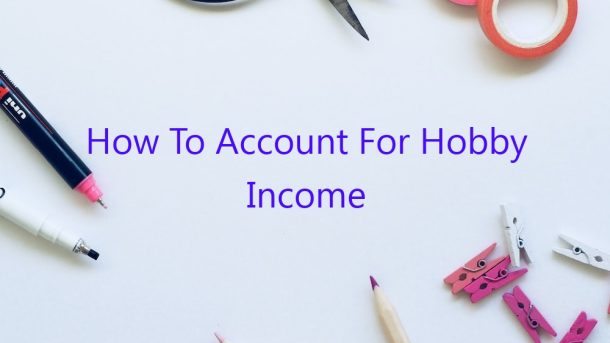If you’re a hobbyist who earns money from your hobby, you may be wondering how to account for that income. The good news is that it’s relatively easy to do, as long as you keep some key points in mind. In this article, we’ll provide an overview of how to account for hobby income, including some tips on how to make the process simpler.
Generally, there are two ways to account for hobby income: you can either treat it as self-employment income or as taxable income. The approach you take will depend on a few factors, including how much money you earn from your hobby and how much time you spend on it.
If you’re earning a small amount of money from your hobby, you can probably treat it as taxable income. This means that you’ll include the income on your tax return, and you may also be able to claim some deductions related to your hobby. However, if you’re earning a significant amount of money from your hobby, you’ll likely need to treat it as self-employment income. This means that you’ll need to set up a business account and track your income and expenses separately from your personal finances.
In either case, it’s important to keep track of your income and expenses. This will help you stay on top of your taxes and ensure that you’re not overpaying or underpaying. It can also help you make informed decisions about how to grow your hobby business.
If you’re not sure which approach to take, consult with a tax professional. They can help you assess your situation and make the right decision for your business.
Thanks for reading! We hope this article was helpful.
Contents
- 1 How do you record hobby income?
- 2 How much money can you make as a hobby before paying taxes?
- 3 Do you have to report hobby income to IRS?
- 4 Is income from a hobby considered earned income?
- 5 Is selling crafts considered income?
- 6 Can I deduct expenses for hobby income?
- 7 At what point does a hobby become a business?
How do you record hobby income?
When it comes to taxes, there are a lot of things to keep in mind. And for people who have a hobby that also earns them income, it can be tricky to figure out how to record that income correctly. Here’s a guide to help you out.
The first thing you need to do is figure out if your hobby counts as a business. To do this, ask yourself the following questions:
-Do you expect to make a profit from your hobby?
-Do you keep track of your expenses and income associated with your hobby?
-Do you have the necessary licenses and permits to run a business?
-Do you advertise or sell products or services related to your hobby?
-Do you have any employees related to your hobby?
If you answer yes to any of these questions, then your hobby is likely a business and you should record the income and expenses associated with it accordingly.
If your hobby doesn’t meet any of the criteria listed above, you should still track your income and expenses, but you can do so using a simply record keeping system like a spreadsheet or a journal.
No matter how you track your income and expenses, it’s important to be as accurate as possible. This will help you stay organized and ensure that you’re paying the correct amount of taxes on your hobby income.
How much money can you make as a hobby before paying taxes?
As a U.S. citizen, you are required to pay income taxes on all of your earnings, regardless of whether that income is from a job, investment, or hobby. How much tax you owe on your hobby income depends on a variety of factors, including your total income, the type of hobby activity, and whether your hobby is considered a business.
In general, you must report all income from your hobby activity on your tax return. This includes money you earn from selling items you made or goods you collected, as well as any reimbursements you receive for expenses related to your hobby. If your hobby is a business, you may be able to deduct some of your expenses as business expenses. However, not all hobby expenses are deductible.
The good news is that most hobby income is taxed at your regular income tax rate. There is no special tax rate for hobby income. In most cases, you will not have to pay any additional taxes on your hobby income.
There are a few exceptions, however. If your hobby is a business and you make a profit, you may have to pay self-employment tax on that income. You may also have to pay estimated taxes if you owe more than $1,000 in tax for the year.
If you have any questions about how much tax you may owe on your hobby income, please consult a tax professional.
Do you have to report hobby income to IRS?
Do you have to report hobby income to the IRS?
The answer to this question is not a simple one, as it depends on the specific circumstances involved. Generally speaking, however, any income that is earned from a hobby must be reported to the IRS.
There are a few exceptions to this rule, however. If you are able to show that your hobby is not actually a business, and that you are not making a profit from it, you may not need to report the income. Additionally, if the income from your hobby is relatively small, you may be able to exclude it from your taxes.
If you are unsure whether or not you need to report your hobby income, it is best to speak with a tax professional. They will be able to help you determine whether or not you need to file a return, and will be able to guide you through the process.
Is income from a hobby considered earned income?
Is income from a hobby considered earned income? This is a question that many people have, and the answer is not always clear. Generally, income from a hobby is not considered to be earned income. However, there are some exceptions to this rule.
One exception is if you are self-employed and your hobby is the source of your income. In this case, your income from the hobby would be considered to be earned income. Another exception is if you are using your hobby to generate income to support yourself and your family. In this case, your income from the hobby would be considered to be earned income.
There are a few other factors that may be considered when determining whether or not income from a hobby is considered to be earned income. These factors include the amount of time you spend on your hobby, the expenses you incur in relation to your hobby, and whether or not you are able to generate a profit from your hobby.
If you are not sure whether or not your income from a hobby is considered to be earned income, you should speak to an accountant or tax specialist. They will be able to help you determine whether or not you need to report your income from your hobby to the IRS.
Is selling crafts considered income?
There is no definitive answer to this question as it depends on individual circumstances. Generally speaking, however, selling crafts can be considered income if the crafts are sold for a profit.
If you are selling crafts as a hobby, then the money you make from selling them is not considered income. However, if you are selling crafts as a business, then the money you make from selling them is considered income. This is because you are making a profit from your sales, which is indicative of a business venture.
If you are selling crafts to make a profit, then you need to report the income you make from those sales to the IRS. This is because the money you make from selling crafts is considered taxable income. There are a few things you can do to reduce your tax liability on this income, such as claiming the income as a hobby loss. However, it is important to speak with an accountant to determine the best way to report this income.
Overall, selling crafts can be considered income if the crafts are sold for a profit. If you are selling crafts as a hobby, then you do not need to report the income you make from those sales. However, if you are selling crafts as a business, then you need to report the income you make from those sales to the IRS.
Can I deduct expenses for hobby income?
If you earn income from a hobby, you may be able to deduct some of the expenses associated with that income.
The general rule is that you can only deduct expenses that are necessary and ordinary for the activity. For example, if you are a musician and you earn income from playing gigs, you can deduct the cost of transportation, lodging, and food related to the gigs.
However, if you are simply hobbyist who likes to play music on the side, you may not be able to deduct these expenses. The reason is that the IRS is likely to consider the activity of playing music for leisure a personal expense, rather than a business expense.
There are a few exceptions to this rule. If you are a professional artist, for example, you can deduct any expenses related to your art. This includes the cost of materials, studio rent, and even your commission fees.
Additionally, if you are using your hobby to generate income for a charity, you may be able to deduct some of your expenses. This includes the costs of materials, shipping, and even your mileage.
Overall, if you are hoping to deduct expenses related to your hobby income, you will need to be able to demonstrate that the expenses are necessary and ordinary for the activity. If you can do this, you may be able to deduct a wide range of expenses, including transportation, lodging, and food costs.
At what point does a hobby become a business?
When does a pastime cross the line into becoming a profession? At what point does a hobby become a business? This is a question that many people ask themselves at one time or another.
There is no single answer to this question. It depends on the individual and on the specific circumstances. However, there are some factors to consider when making this decision.
One of the key considerations is whether or not you are making a profit from your hobby. If you are generating income from your activity, then it is likely that it has become a business.
Another important factor is how much time and effort you are putting into your hobby. If you are devoting a significant amount of your time and resources to your pastime, then it is more likely to be a business.
Also consider how important your hobby is to you. If it is something that you really enjoy and you would do even if you didn’t make any money from it, then it is likely still a hobby. But if you are only doing it for the money, then it is more likely to be a business.
Ultimately, it is up to you to decide when your hobby becomes a business. There is no precise line that divides the two. However, by considering the above factors, you can make a more informed decision about what is best for you.




